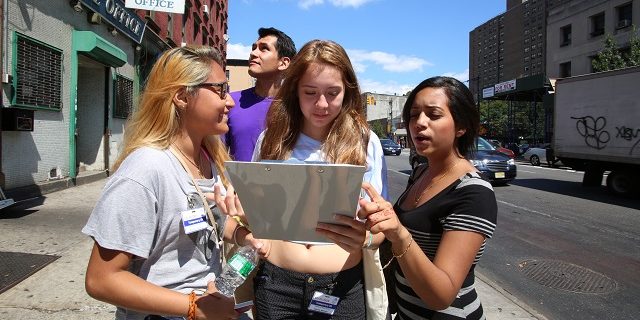
MAPSCorps is a non-profit organization based in Chicago that works with community partners to “train youth to produce high quality data about community assets that everyone can use to improve the human condition.” The Mount Sinai Adolescent Health Center is one of MAPSCorps’ community partners in New York City.
According to a report released by the Pew Research Center in 2017, the New York metropolitan area is home to 1.1 million undocumented immigrants, many of whom live in the East Harlem neighborhood — right next to the Mount Sinai Adolescent Health Center (MSAHC). The MSAHC takes care of some of these patients and provides them with high-quality, free, comprehensive health care, regardless of immigration status or ability to pay.
When I started my project with the MSAHC and MAPSCorps examining the data our high school students collected last summer, I was struck by the abundance of social service organizations and health centers in the neighborhood. In the small area that comprises East Harlem, teens from the MSAHC mapped over 330 of these organizations! I had to ask myself: if there are so many organizations dedicated to helping East Harlem, why are there still so many health concerns surrounding this neighborhood and its undocumented population?
As I dug deeper, I noticed a common theme in most reports on East Harlem’s health needs. While there were few cries for the creation of more health and social organizations, many reports, like Hunter College’s East Harlem Needs Assessment, called for three major improvements:
- More language and cultural competency skills to help earn the trust of people in the community.
- Enhancements in both chronic disease care (like diabetes and heart disease) and specialized care for procedures not as accessible through Medicaid.
- Coordinated outreach between community health centers and the hospitals providing care.
One program seemed to address all of these problems at the same time. In 2015, the Mayor’s office released the “Direct Access” Health Initiative, which aimed to provide reliable and coordinated access to affordable care for immigrants who are excluded from federal and state support. The program worked to tackle each of the three issues. By coordinating care for undocumented immigrants using culturally competent medical translators, the program was able to provide care beyond the Affordable Care Act in order to help those with chronic conditions like diabetes and heart disease.
As I raced to find out more about this program, I was shocked to find it had been disbanded after two years. The program had only helped 1,000 of the 345,507 undocumented immigrants in New York City who do not have health insurance. The initiative appears to have been shut down before it could help communities like East Harlem — a community that desperately needs to support its undocumented population. There was even a report from East Harlem’s Community Board 11 that wanted to designate East Harlem as a priority community for the rollout of Direct Access NYC.
The shutdown of the Direct Access program is especially disappointing given the current climate of fear that undocumented immigrants must contend with. Many immigrants’ human rights have been violated, both at the border and in New York City. The Immigrant Defense Project for instance, has documented 144 cases where the Immigration and Customs Enforcement Agency (ICE) has arrested both undocumented and documented immigrants in and around New York City courthouses.
These arrests, family separation and detention at the border, and an increase in anti-immigrant rhetoric have created an understandable sense of fear in these communities.This fear has a real, concrete impact on the health of undocumented immigrants and their families. “Many people feel there’s a risk to providing information to health centers if the federal government can march in and use that against them,” said one employee from a community health center in East Harlem I spoke to.
In a time where there is an unprecedented assault on undocumented persons, it is more important than ever to follow through on public health programs to ensure that vulnerable populations receive coordinated care.
As a young person aspiring to work in public health, I see the need to humanize rather than dehumanize the individuals within our communities, as well as the need to provide culturally sensitive and coordinated programs on a much larger scale.
Advocating for everyone’s right to health care is now more important than ever. To help solve the health needs of our local East Harlem community, we must find ways to coordinate better care between health centers and hospitals, break down language and cultural barriers, and provide more comprehensive care for chronic conditions. Undocumented immigrants in East Harlem face particularly difficult barriers that we can only solve together.
Our own Mount Sinai Adolescent Health Center is unique in its ability to provide completely free health services to young people regardless of immigration or insurance status. Until the rest of our country starts to see health care as a right rather than a privilege, we must keep advocating.
Oscar Kohut is a returning summer field coordinator for MAPSCorps, which facilitates high school students from the community as they map the various assets in New York City neighborhoods. As a rising Junior at Columbia University studying Human Rights, he someday hopes to work in public health and medicine.
The Mount Sinai Adolescent Health Center is located in New York City. It provides comprehensive, confidential, judgment free health care at no charge to over 10,000 young people every year. This column is not intended to provide medical advice, professional diagnosis, opinion, treatment or services to you or to any other individual, only general information for education purposes only.


